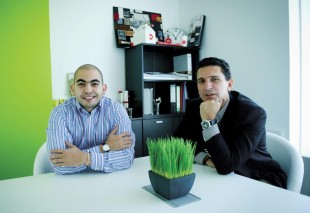

F&B INTERVIEW: Glee Hospitality

The brains behind Glee Hospitality, Aboudi Saadi and Louay Alnajjar, believe it’s out of hotels and onto the street for the future of successful restaurant concepts
Ask managing director Aboudi Saadi, or operations director Louay Alnajjar, about hotel restaurants and your questions won’t be met with much enthusiasm.
The team behind the Dubai-based company Glee Hospitality Solutions, which specialises in F&B business development, are concentrating on what they call ‘pavement restaurants’.
“There is an oversupply in Dubai of high-end restaurants,” says Saadi. “People don’t want to go to a hotel anymore just to have dinner – and anyway, the market for hotel restaurants is saturated. There are on average about five or six in each hotel, but there is a clear lack of good high street restaurants in the UAE.”
Saadi does admit that without an alcohol licence it is harder to make money but is excited about the projects they’ve already opened in Abu Dhabi: Grand Central burger joint and Nolu’s Café, and the eight outlets they’re opening in 2012, including Donatello’s, a fine-dining Italian restaurant in Dubai World Trade Centre.
The one licensed venture Glee does have is The Gramercy in DIFC, and they’re proud of its success: “The Gramercy is our own concept and is doing really well – double what we expected,” says Saadi.
“It was originally launched as a sports bar and there’s been a bit of difficulty repositioning it in the market, but we’ve turned it into a gastro jazz pub and introduced a live jazz band in the evenings and now about 30-40% of our sales are done in the evening.
“It’s tough competing in DIFC,” Saadi admits. “Some of the biggest brands in the world are there and we’re up against them. We haven’t spent on marketing yet, but we’re doing well, and it’s in our plan.”
As well as hotel restaurants, it is international brands that Saadi and Alnajjar aren’t making much time for.
Article continues on next page ...
“I strongly believe 2012 is the year for homegrown brands to come into their own,” Saadi explains. “People are tired of paying over the odds to be franchising from the US or the UK. There are big fees involved. There is the talent here now to open and run businesses.”
Saadi’s past experience includes working in Paris and London setting up chef-driven, Michelin-starred restaurants, including The Greenhouse and Umu. He moved to Dubai over four years ago and set up Glee Hospitality with Alnajjar, whose background is in asset management.
Alnajjar admits that the trend of switching to F&B business from outside the industry is apparent in Dubai, but says not everyone does their research properly first.
“F&B is a hot topic here,” he explains. “You don’t have to go out looking for backers – people call you. However, a lot of people underestimate what it costs to set up a restaurant. The start-up costs are high.
There are lots of hidden ones like staff visas and accommodation, medicals and insurance. You can’t really do a project for under AED 2 million (US $545,000). It costs you AED 6,500 (US $1,700) just in visas.
“It costs more to open a restaurant here than in Europe,” Saadi agrees. “Rents are very high,” Alnajjar continues. “In Europe and the US you pay around 8-10% of your income, here it’s around 12-18%.
It’s come down from four or five years ago, but it’s still high. You pay a percentage of your base sales. It’s more in favourable areas, and cheaper in areas like Al Barsha. In Dubai Mall it’s almost impossible. You pay approx 10% of your income plus 10% of sales as base rate – that’s more than AED 200 (US $54) per square foot!”
So it’s out of the malls and hotels and on to the pavement Glee will go, in its effort to open higher quality, affordable restaurants with atmosphere for diners who want something different in the UAE.